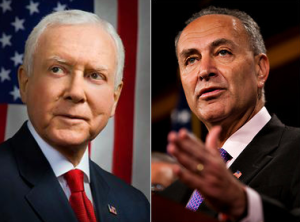 Last week the Senate Finance Committee held a hearing on the Obama Administration’s trade policy, in which U.S. Trade Representative Michael Froman was the sole witness.
Last week the Senate Finance Committee held a hearing on the Obama Administration’s trade policy, in which U.S. Trade Representative Michael Froman was the sole witness.
Prepared statements from Chairman Orin Hatch, Ranking Minority Leader Wyden, and Ambassador Froman, and video of the full hearing are here. Actually, most of the hearing is on the video, but the committee edited out the protestors who disrupted the hearing. Democracy Now has the video and transcript of the protest here.
During Q&A, many of the Senators brought up enforcement of trade agreements as a very important area for USTR to focus its energies. Two Senators, in particular, indicated they wanted the U.S. to be been more active in trade disputes over intellectual property, through either FTA frameworks or bilateral measures:
Orin Hatch: Last year I was disappointed you didn’t take India to WTO for itis refusal to bring India to WTO because of IPR. High level working groups are simply not enough. . Now, less than two weeks ago India refused to issue a patent on an important Hepatitis C drug based on a patentability standard that is out of step w rest of world, and which many think is in violation of WTO rules. can you express your plan to take action about India’s breaches of our companies’ IPR. [38.19]
Froman answered that USTR has been in talks with the new Indian government, they held the first US-India trade forum last November, and he had just returned from another trip to India to address this issue and others. He said that USTR is in the process of providing comments to India on its new IPR policy.
Orin Hatch – Canada’s creation of a heightened standard for patentability, or for patentable utility for pharmaceutical patents is a serious problem for our US innovators. This standard is inconsistent with other countries and undermines the ability of US innovators to obtain and enforce patent rights in Canada. It is also inconsistent with Canada’s obligations under the World Trade Origination and under the NAFTA. What are you doing to ensure Canada’s patentability standards are consistent with its international obligations? [41.30]
In response, Froman said that his office has “raised this concern directly and repeatedly” with Canada, but that both USTR and the Candian authorities are waiting to see how the “current litigation” proceeds. (The litigation is actually a trade dispute under NAFTA, in which Eli Lilly is seeking $500 million in damages after losing its litigation in the Canadian court system.)
Charles Schumer – I’m very skeptical about enforcement in these deals. It seems to me we sign these deals, we go right to the letter of WTO, the other countries thumb their nose at WTO, they take us to court, and we lose… India regularly waives patent rights on pharmaceuticals, we seem to shrug our shoulders, the enforcement mechanism is powerless. So I’m exploring proposals to combat intellectual property theft by countries like China and streamlined adjudication when us business are taken advantage of by state owned monopolies, and I hope you’ll work with me on some of these ideas. … the Administration needs to prove to us and the world that we are going to start fighting back… We need concrete, predictable, and unilaterally, that’s a whole new world, unilaterally enforceable mechanisms in place to show the world that we’re going to protect our workers and our economy. [57.08]
Here Froman gave a careful answer in which he agreed USTR must do everything it can “consistent with our international obligations” to enforce our trade rights.
For further coverage of the hearing see these news stories:
- Inside U.S. Trade. Hatch Says New TPA Bill Will Not Be Major Revamp, But May Contain Some Changes. (Link)
- Inside U.S. Trade. Hatch Says He May Oppose TPP Without 12-Year Data Exclusivity For Biologics. (Link)
- Krista Huges for Reuters. Top U.S. trade negotiator says Pacific pact nearly ready. (Link)
Also, Public Citizen has a fact-checking piece on its Eyes On trade Blog: 10 Tall Tales on Trade: Fact-Checking Obama’s Top Trade Official. Link.




